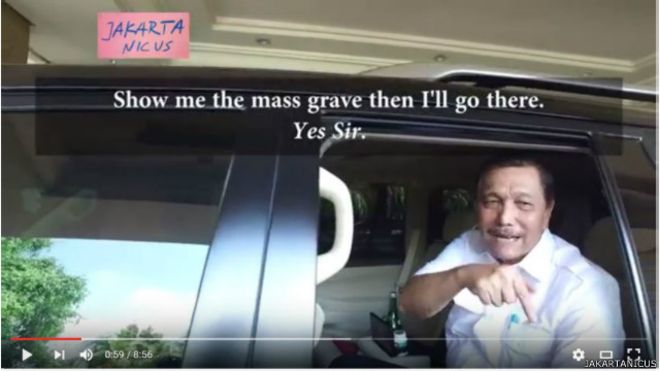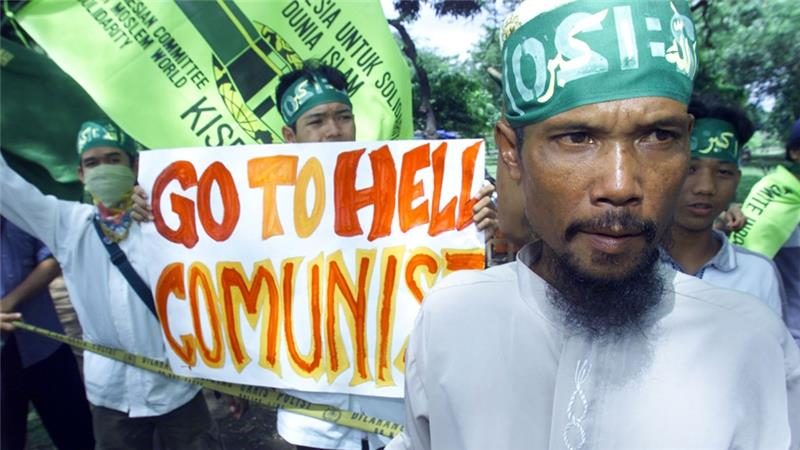Doubts and divisions emerge from symposium on the country’s notorious 1965 killings. Yet, there is still hope for reconciling a haunting past, writes Ariel Heryanto.
No one disputes the “National Symposium on the 1965 Tragedy” (Jakarta, 18-19 April 2016) was a historic milestone in Indonesia’s struggle to come to terms with its darkest history, the anti-communist bloodbath from late 1965. However, few can agree what to make of it, how to respond to the initiative, and what to expect from it. The event was full of ambiguities and contradictions that got lost in most reports and commentaries in international and English media.
The event was jointly sponsored and organised by unlikely partners: military officers within the government and its strongest critics. One lesson I took from being an invited speaker (the only one from outside Indonesia) was that the Symposium manifested, more clearly than ever before, doubts, indecisiveness and divisions both within the country’s political elite, as well as among their critics and human rights activists over what to do with the haunting past, and how to move forward toward some kind of closure.
Notwithstanding the enigmas, the Symposium deserves congratulations for being the first national forum, broadcast live for the global audience, where elements from extremely diverse parties exchanged views. More importantly, there was a common commitment from each party to listen attentively to unpleasant views from other parties.
Exceptions to such novel civility existed. They were rare, including a minor and inconsequential incident, or another that requires further scrutiny. For instance, the audience jeered and interrupted when anti-communist poet Taufiq Ismail read sloganeering poetry about the communist cruelty. In opening the Symposium two retired generals made highly provocative remarks.
Coordinating Minister for Politics, Law and Security Affairs, Luhut Panjaitan, declared in a loud and commanding voice that there was no way for his government to offer an apology to the victims of the 1965 massacre. He questioned the widely held view of the large number of victims of the massacre (between half to one million). Supporting his statement was his senior Sintong Panjaitan who spoke next. In contrast, to its reaction to poet Ismail, the audience held breath as the two former generals spoke and immediately launched a series of counter-statements.
Their statements flew in the face of the statement presented just minutes earlier by Lieutenant General (Ret) Agus Widjojo, chair of the advisory council for the Symposium. With admirable humility and open-mindedness, Widjojo invited all participants to speak frankly and truthfully, to be prepared to listen to differences and to work collaboratively to seek the best possible scenario that all victims deserve.
One of the most liberal minded officers among his rank, Widjojo was the key initiator of the Symposium. Another key person behind the Symposium, senior politician Sidarto Danusubroto, closed the event with extremely promising statements, in line with those of Widjojo at the outset.
But bad news makes good news. It was the statements from the two Panjaitans that most attracted reporters and commentators in the international media for many days that followed. Such reports suggest the Symposium was a complete sham, or one that was designed to fail. If so, why did the government bother to sponsor it in the first place? Black-and-white journalist reporting is ill-prepared to answer such a question.
As Luhut Panjaitan entered his car and was about to leave the venue, he softened his stance to activists who challenged his statement. He indicated a commitment to visiting the mass graves of the 1965 massacres. Days later, his position softened even further when the President instructed him to be more open to the issue. In less than a week, he said a formal state apology was under serious consideration.

Luhut talks to activists as he leaves the symposium. Image: Jakartanicus.
Binary opposites of good versus bad was the dominant perspective at the height of the Cold War leading to the 1965 massacre. This legacy remains alive today and is not confined among international observers of Indonesia. Objection to the Symposium was made by those on the extreme right and left of Indonesia’s contemporary political spectrum.
A number of human rights activists and advocates for the 1965 victims criticised the Symposium. Some suspected it was a government ploy to whitewash and self-exonerate. Others called for a boycott, and called fellow activists traitors for attending.
At the other end of the political spectrum, an anti-communist militia organisation, Front Pancasila, denounced the symposium, calling it a communist event. They vowed to mobilise their mass supporters to disrupt the gathering. They did come to the heavily guarded venue, only to be quickly pushed away by the police after some brawls.
Internal sources told me that the army was very unhappy with the Symposium. Top officers reprimanded Luhut’s for opening the event, calling Agus Widjojo a communist (despite his being a son of a general killed by the left-leaning movement in 1965) and demanded the Symposium be cancelled. Some senior military officers scheduled to speak, including one on my panel, did not show up.
The bits and pieces of contradictory information available at the moment lead me to reread Luhut’s oscillating position. When opening the Symposium, I think Luhut spoke not so much to the audience in front of him, but to the military outside the venue as his target audience, restoring his questioned loyalty to the corps. He may be more concerned with his own career and reputation than the 1965 issue or how it can be resolved.
If forced, he would soften his stance quickly, and move into a safe zone under President Widodo’s more liberal policy. Likewise, if circumstances demand, he would work with human rights activists, but prefers that the latter to do the dirty and difficult work of collecting evidence of the crimes of the state.
This is to ensure that he would remain acceptable to those in opposition to the revelation of truth of the 1965 massacre, and all the consequences that might follow from such revelation.
Ariel Heryanto is Professor at the Australian National University’s School of Culture, History and Language. He was an invited speaker at the two-day symposium on Indonesia’s mass killings, “Dissecting the 1965 tragedy”.
 Facebook
Facebook  Twitter
Twitter  Soundcloud
Soundcloud  Youtube
Youtube  Rss
Rss 